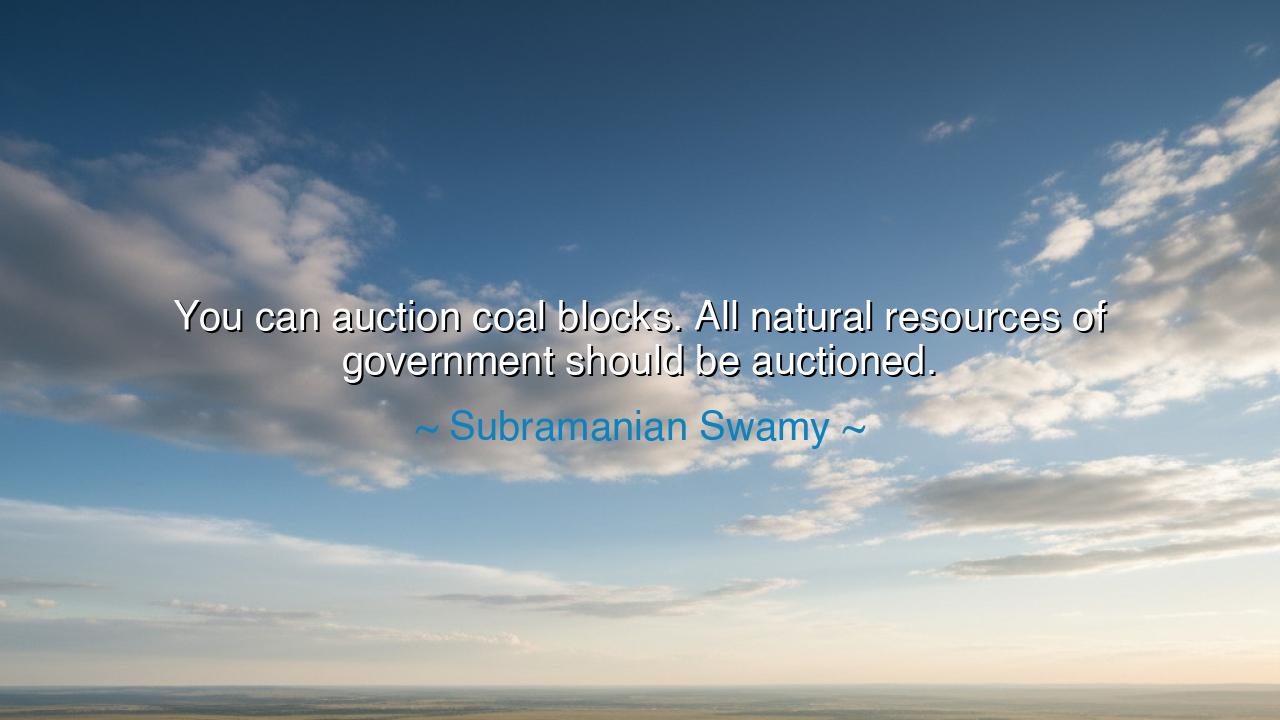
You can auction coal blocks. All natural resources of government






In the ceaseless story of nations, where wealth is drawn from the depths of the earth and the strength of the people, there arises a question both ancient and enduring: to whom do the treasures of the land belong? It was in answer to this question that Subramanian Swamy, a man of fierce intellect and fiery conviction, declared: “You can auction coal blocks. All natural resources of government should be auctioned.” His words, sharp as a sword and clear as sunlight, carry within them a principle as old as justice itself—that the riches of the earth, being born of none and belonging to all, must be governed not by favor or corruption, but by fairness, transparency, and accountability.
The meaning of these words reaches far beyond the coal blocks that stirred the controversy of his time. In the early years of the twenty-first century, India faced the great scandal of resource allocation—the Coalgate scandal, where vast reserves of coal, the black blood of industry, were granted to private entities without open competition. The nation, rich in mineral promise but wounded by inequality, watched as the gifts of nature were bartered in secrecy. Against this backdrop, Swamy’s call was both a cry for reform and a return to moral order: auction them, he said—let the process be open as the sky, so that the wealth of the land serves the many, not the few.
The ancients, too, wrestled with this question of stewardship. In the days of the Greek city-states, philosophers taught that the resources of the polis were held in trust for all its citizens. Aristotle warned that what is common to many is easily neglected unless guarded by law and virtue. In the empires of the East, from the dynasties of China to the kingdoms of India, kings were seen not as owners of the land, but as its caretakers. The Mandate of Heaven, they believed, was lost when rulers forgot that rivers, forests, and mines were not royal possessions but sacred trusts. Swamy’s words, though spoken in a modern age, are the echo of that timeless creed—that power must serve the public good, and wealth must flow by merit, not by privilege.
To auction is not merely to sell; it is to reveal. It is to place value in the light where all may see it, where competition ensures fairness, and fairness ensures trust. What Swamy demands, therefore, is not commerce, but clarity—a system in which the dealings of the state are open to the scrutiny of its people. For the natural resources of government—coal, oil, gas, forests, water—are not the inheritance of politicians or corporations; they are the collective wealth of generations, purchased with the patience and labor of the nation itself. To distribute them in secrecy is to betray the people; to allocate them in the open is to honor them.
Let us recall the fate of nations that forgot this wisdom. In the twentieth century, vast empires in Africa and South America were blessed with gold and oil, yet cursed with poverty. Why? Because their rulers claimed these resources for themselves, enriching their circles while leaving their people in despair. The land wept beneath their feet, for it was not greed that destroyed them, but the absence of justice. The ancients would have said: when the king hoards the harvest, famine of the spirit follows. But when the harvest is shared by rule of law, peace endures.
Subramanian Swamy’s words, then, are not merely economic—they are moral. They remind us that transparency is the foundation of trust, and trust is the breath of democracy. When citizens see their government act with honesty, when they see natural wealth shared through open means, their faith in the state is renewed. But when decisions are made in shadow, corruption spreads like rot in wood—silent, unseen, and deadly. Swamy’s call to auction all natural resources is, at its heart, a call to cleanse the system, to let light enter the chambers where secrecy once reigned.
Therefore, my children of the modern age, learn this truth and carry it forward: what is held in common must be governed in justice and openness. Let every citizen be a guardian of accountability; let every leader remember that their power is a loan, not a possession. Speak for transparency where there is silence, and demand fairness where there is favoritism. For a nation’s true wealth lies not in its mines or rivers, but in the integrity of its governance and the trust of its people.
Thus, when Subramanian Swamy declared that the resources of the state must be auctioned, he spoke not only as an economist, but as a guardian of the public conscience. His words are a mirror held before every government, a reminder that the treasures of the earth belong to the people—and that to protect them, one must rule not in secrecy, but in light.






AAdministratorAdministrator
Welcome, honored guests. Please leave a comment, we will respond soon